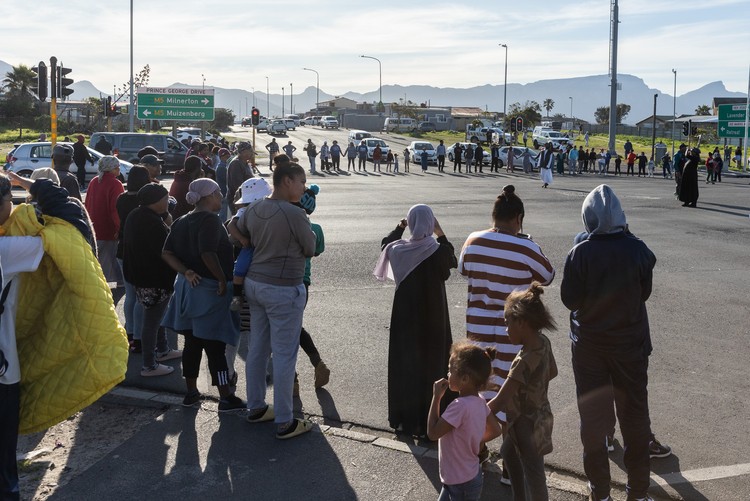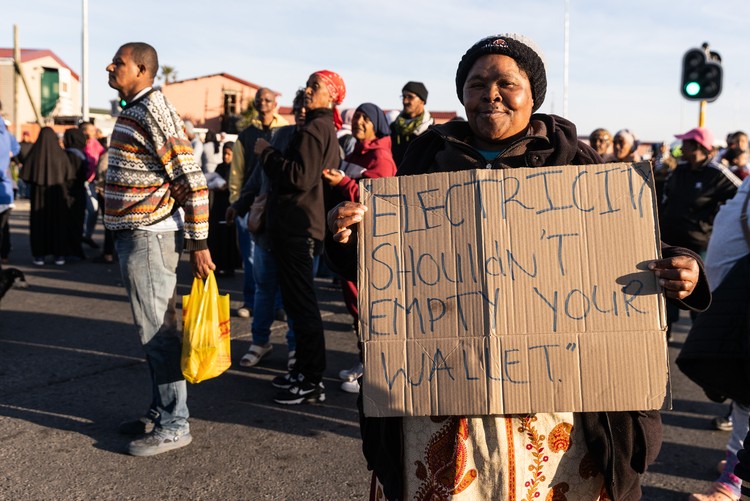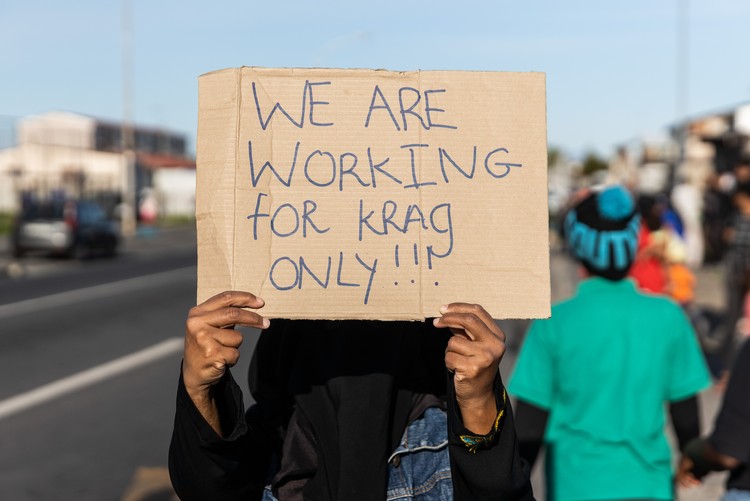Cape Town electricity protest brings traffic to a halt
“We are eating less food because we have to pay more for electricity”
Lavender Hill residents blocked Prince George Drive on Thursday afternoon to protest high electricity tariffs. Photos: Ashraf Hendricks
- Lavender Hill residents brought traffic on Prince George Drive to a standstill on Thursday to protest high electricity tariffs.
- They say they’ve seen a significant increase in electricity costs after new electricity prepaid meters were installed in their homes recently.
- But the City of Cape Town says that the compulsory meter replacement does not increase costs, and the price per unit between the different meters are the same.
- The City added that it has seen a notable increase in prepaid meter tampering cases.
Over 100 residents from Lavender Hill brought traffic along Prince George Drive to a standstill on Thursday to protest high electricity tariffs.
Protesters claim that they have seen a significant increase in electricity costs after new electricity prepaid meters were installed in their homes recently. Protesters formed a human chain in the middle of the road, forcing motorists to use alternative routes. At one point a fire was lit but it was quickly doused and cleaned up. One protester said, “This is not that kind of protest”. Law enforcement officers were on the scene.
“This is a critical situation that our people are facing,” said Tasneen Davids, a Lavender Hill resident and one of the protest organisers. He said that pensioners who rely on grants to get through the month “will have to borrow money to cover their electricity”.
“What about food? What about water? What about their monthly rent as well?”. He said that residents want the City of Cape Town to come to their community and explain to residents why electricity tariffs are so high.
Fatima Isaacs, who was part of the human chain blocking the street, said that she is joining the protest after new meters were installed increasing her electricity tariffs. The mother of four minors told GroundUp previously paid R250 per month and now pays R500. “We are eating less food because we have to pay more for electricity,” she said. She said Eskom needs to help them and bring the price of electricity down.
Dorothy Soetwater says electricity has “skyrocketed” since they’ve installed the new meters. Soetwater says that she spends more than R2,000 a month on electricity, and as a result buys less food and has to borrow from money lenders.
In a statement following the group’s morning protest on Thursday, the City of Cape Town clarified that the compulsory meter replacement did not increase costs, and the price per unit between the different meters are the same.
“In recent years the City has observed a notable increase in prepaid meter tampering cases. It is our view that these incidents are linked to the growing cost of living crisis driven by unaffordable and unreasonable electricity tariff hikes proposed by Eskom and approved by the National Energy Regulator (NERSA) over the years. On Wednesday Mayor Geordin Hill-Lewis, wrote to NERSA, asking it to reject Eskom’s unconscionable 44% proposed electricity hike,” the City wrote. In June, Eskom applied for a 44% tariff increase for 2025.
The City said that there are a number of reasons why consumers could be seeing higher costs. They said that when a faulty meter is replaced, residents sometimes see an increase in their electricity costs as they are now paying the correct amount. When Eskom increases the price of electricity, they have to do the same and in winter, households generally use more electricity.
The City does offer subsidised electricity allocation to qualifying households and significant price reductions to vulnerable households who use less than 450 units a month.
Pensioner Jainap Lewis said that she is using most of her SASSA grant on electricity. Even with a gas stove, she spends over R2,000 a month.
“We are working for electricity only” read one of the posters.
Mark Schrikker said that in a house of four people they pay over R3,000 for electricity. Schrikker is the chairperson of the 7945 Community Action Group, a grassroots organisation that helps the community with issues. He said that these high tariffs are “suffocating” the community.
“People are suffering,” he said. Schrikker said that this is going to “boil over” in the Western Cape if the City does not address this issue. He said that since they’ve installed the new unit, R50 of electricity lasts them only one day.
Schrikker said they met with City officials on Friday. He said they are now demanding that the new meters be removed and that protests will continue.
Support independent journalism
Donate using Payfast

Don't miss out on the latest news
We respect your privacy, and promise we won't spam you.
Next: Canadians challenge new Naspers CEO over work conditions
Previous: Taxi bosses demand children use their services to get to school
© 2024 GroundUp. This article is licensed under a Creative Commons Attribution-NoDerivatives 4.0 International License.
You may republish this article, so long as you credit the authors and GroundUp, and do not change the text. Please include a link back to the original article.
We put an invisible pixel in the article so that we can count traffic to republishers. All analytics tools are solely on our servers. We do not give our logs to any third party. Logs are deleted after two weeks. We do not use any IP address identifying information except to count regional traffic. We are solely interested in counting hits, not tracking users. If you republish, please do not delete the invisible pixel.



